Charles E W Bean, Diaries, AWM38 3DRL 606/253/1 - 1918 - 1939 - Part 19
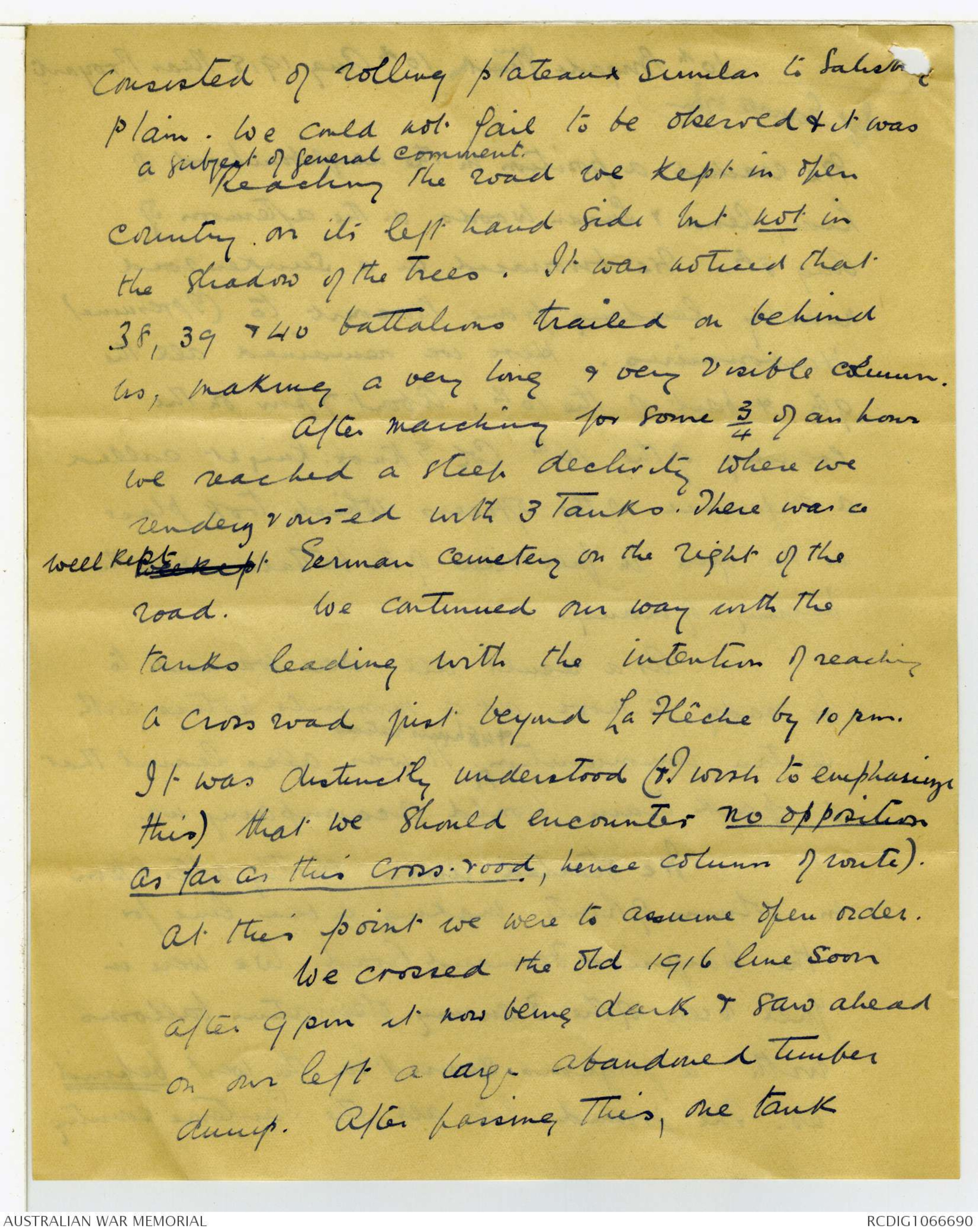
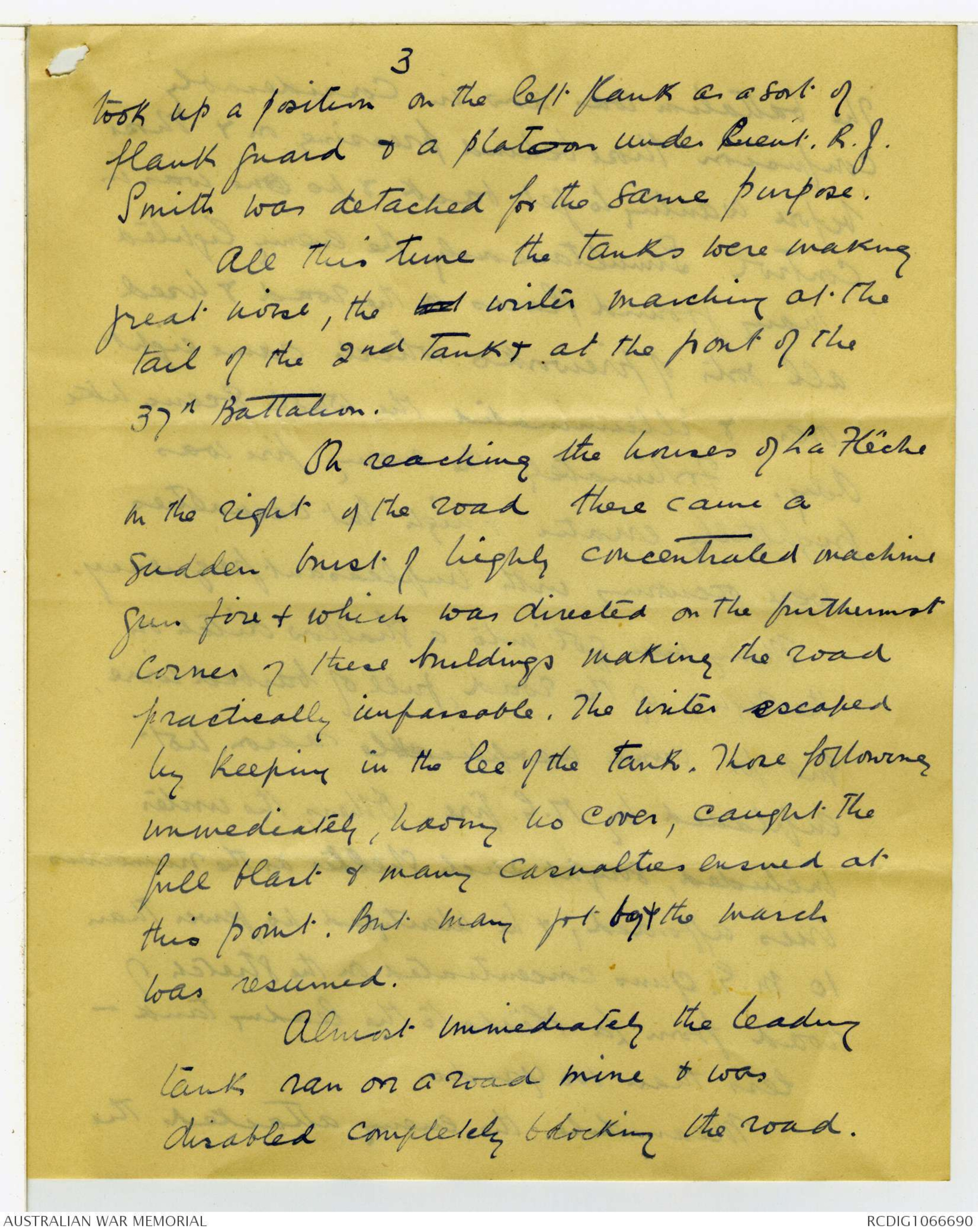
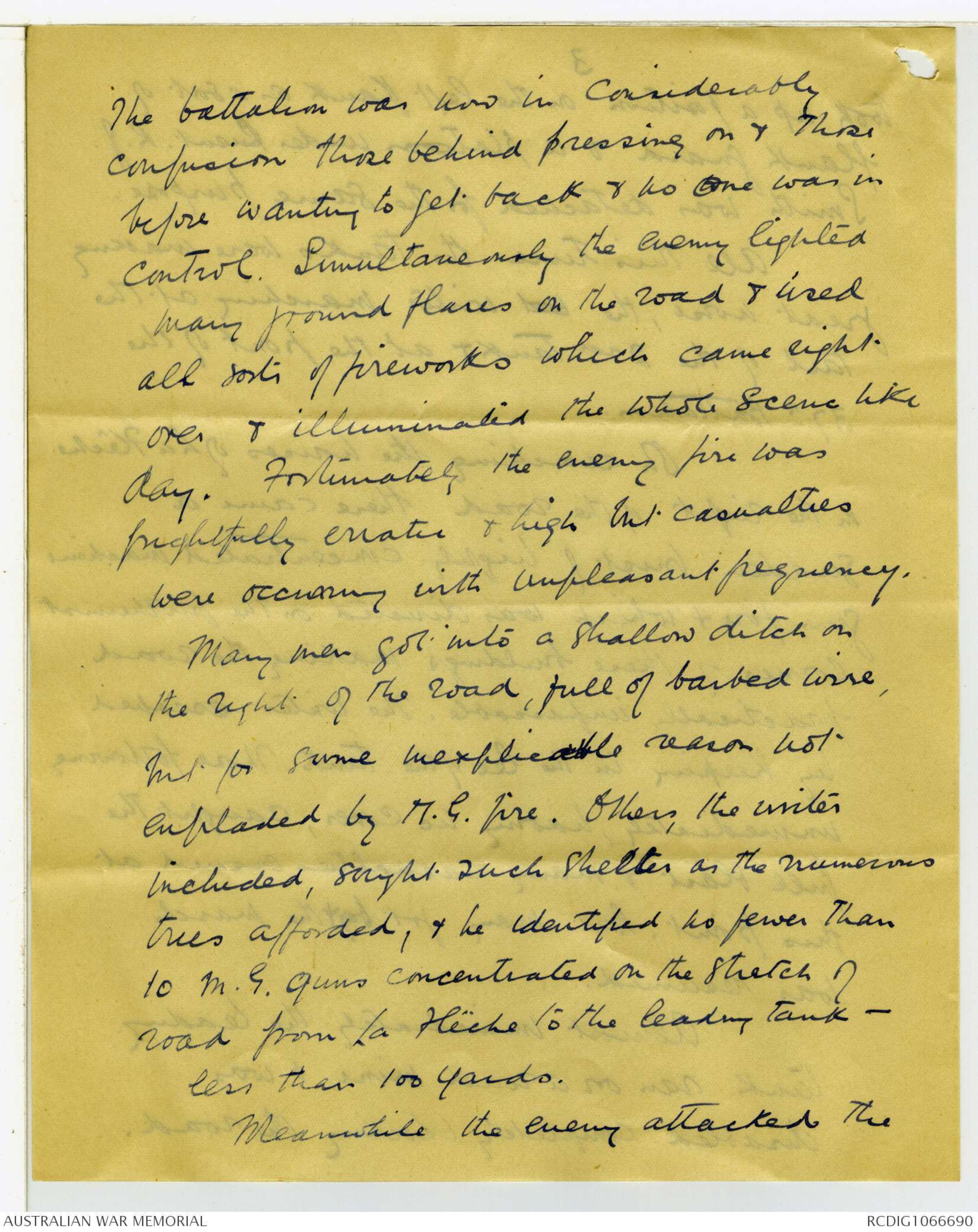
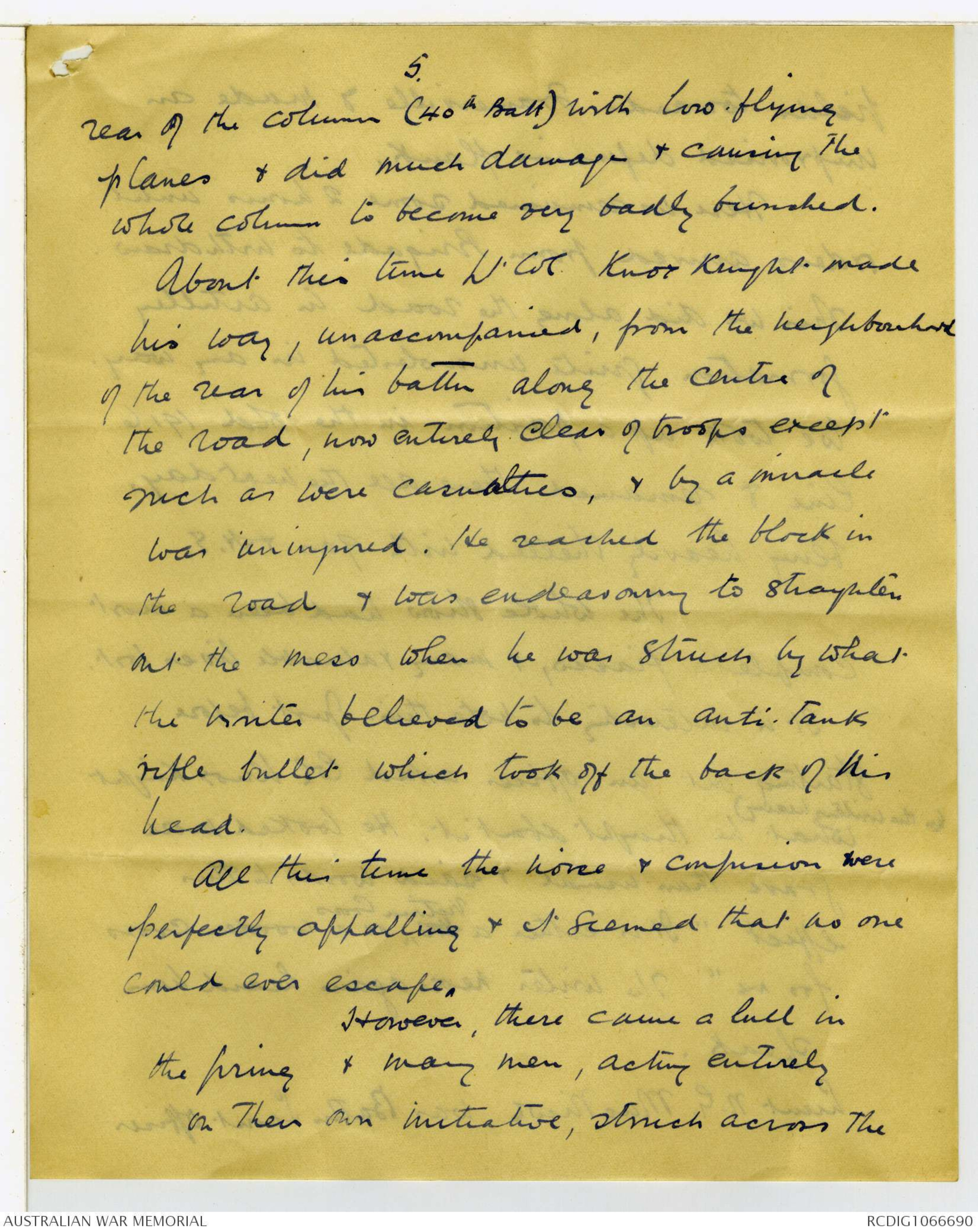
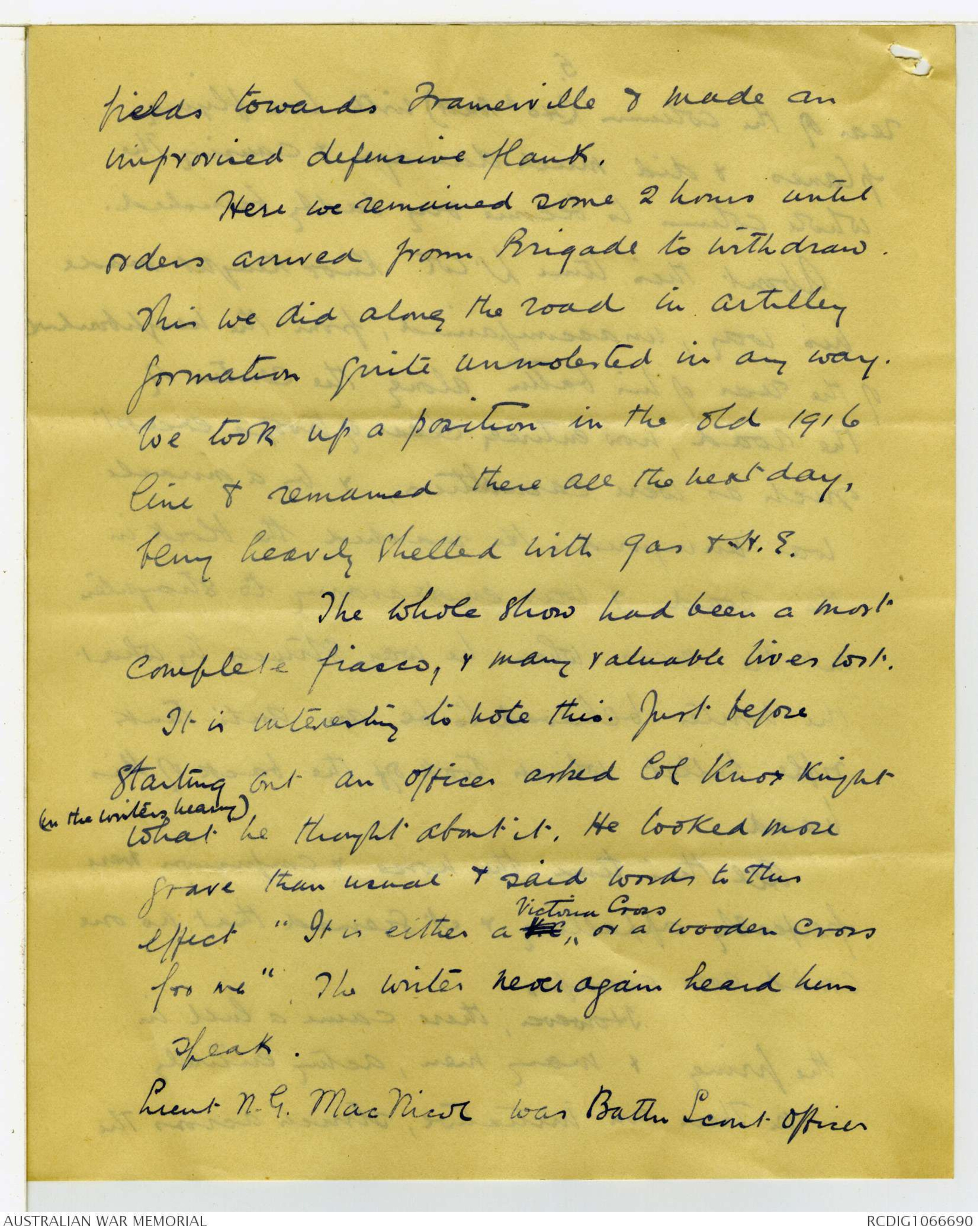
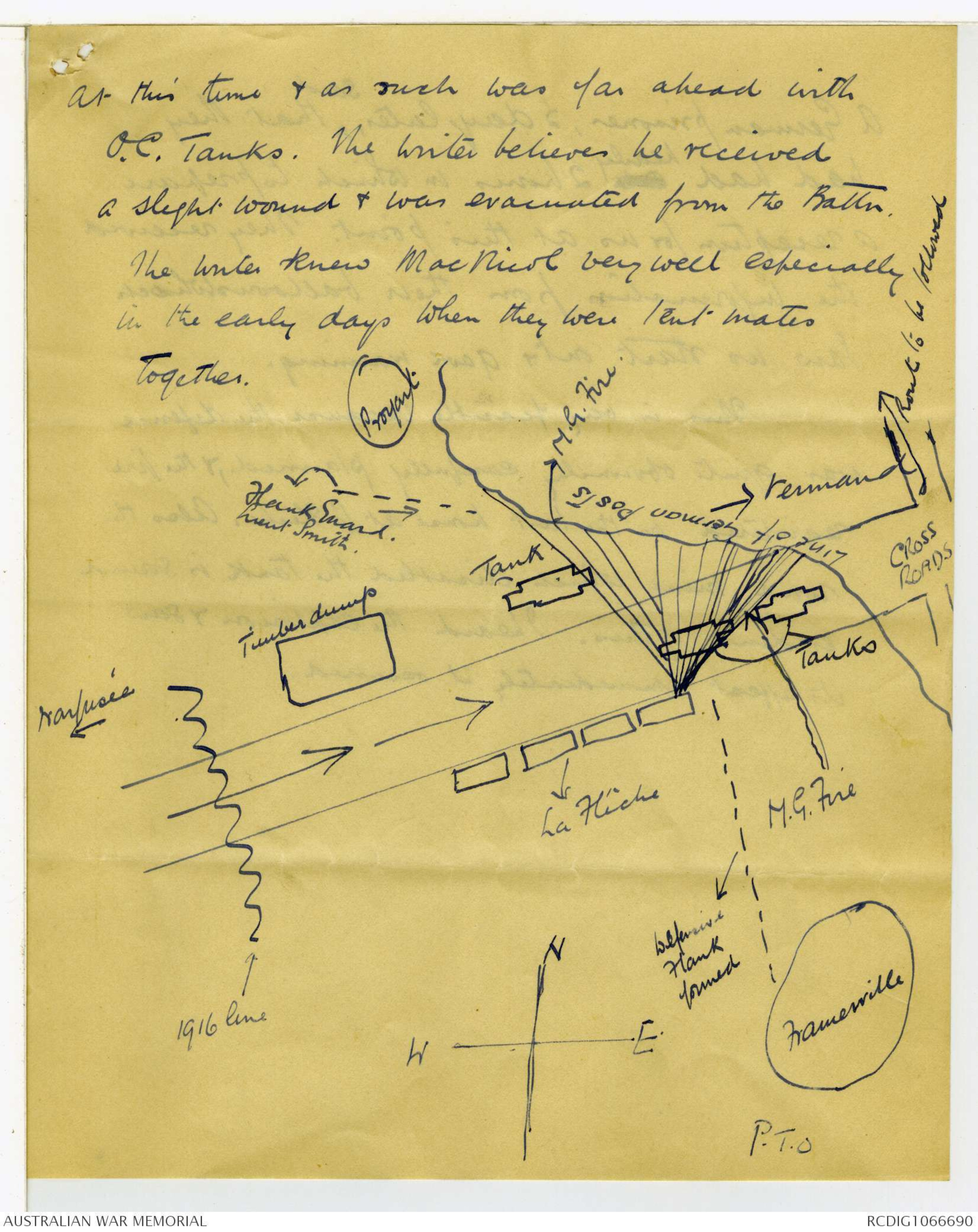
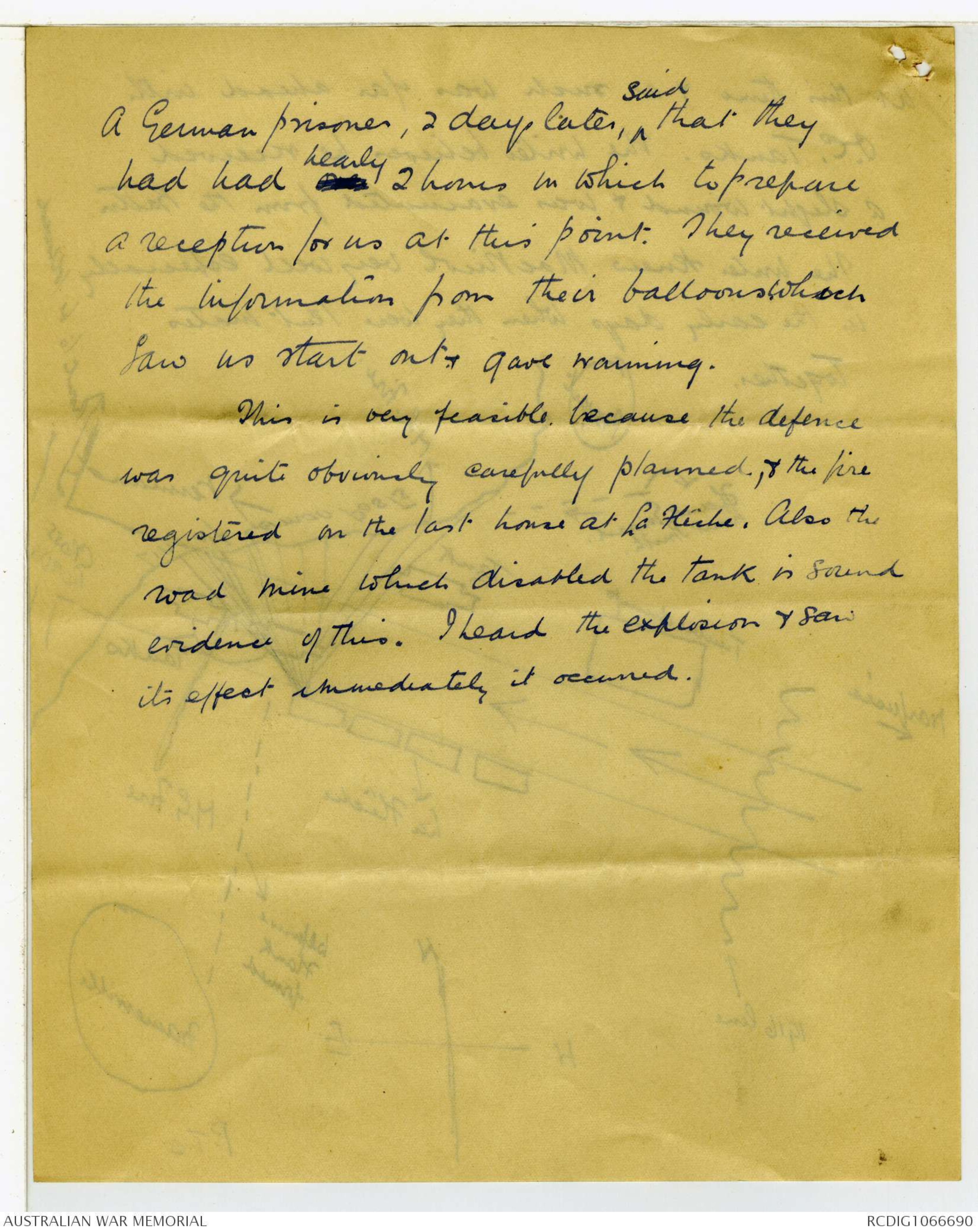
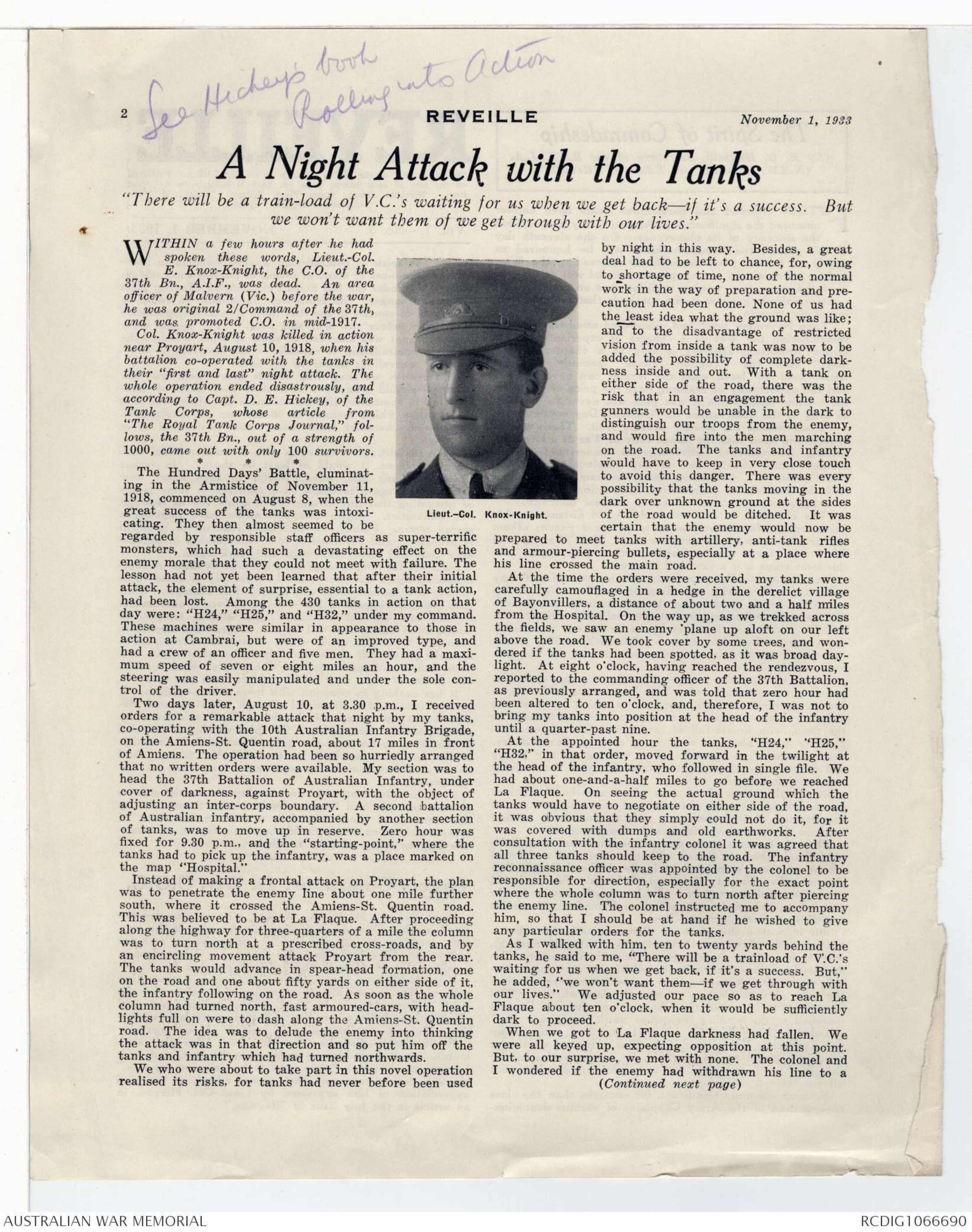
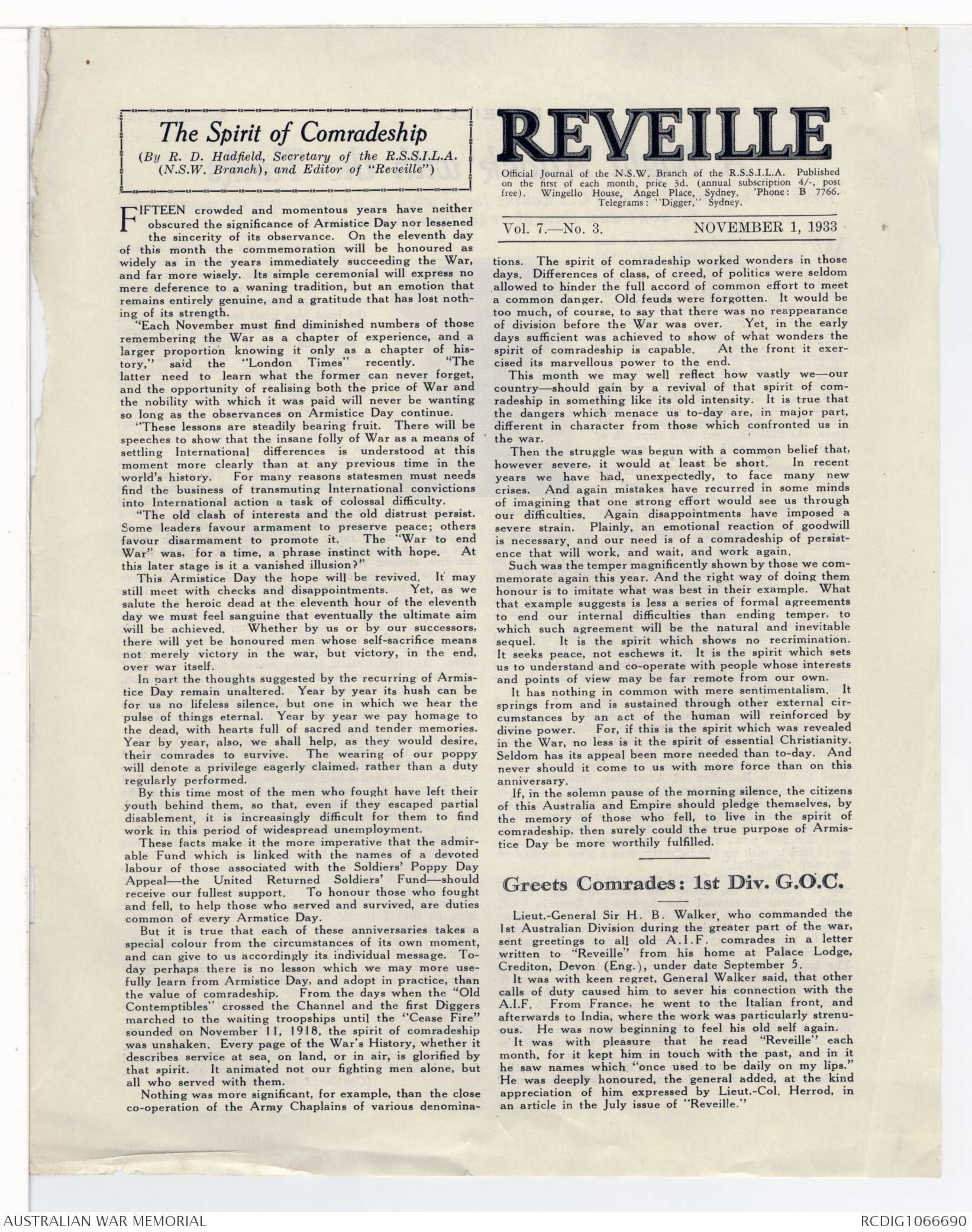
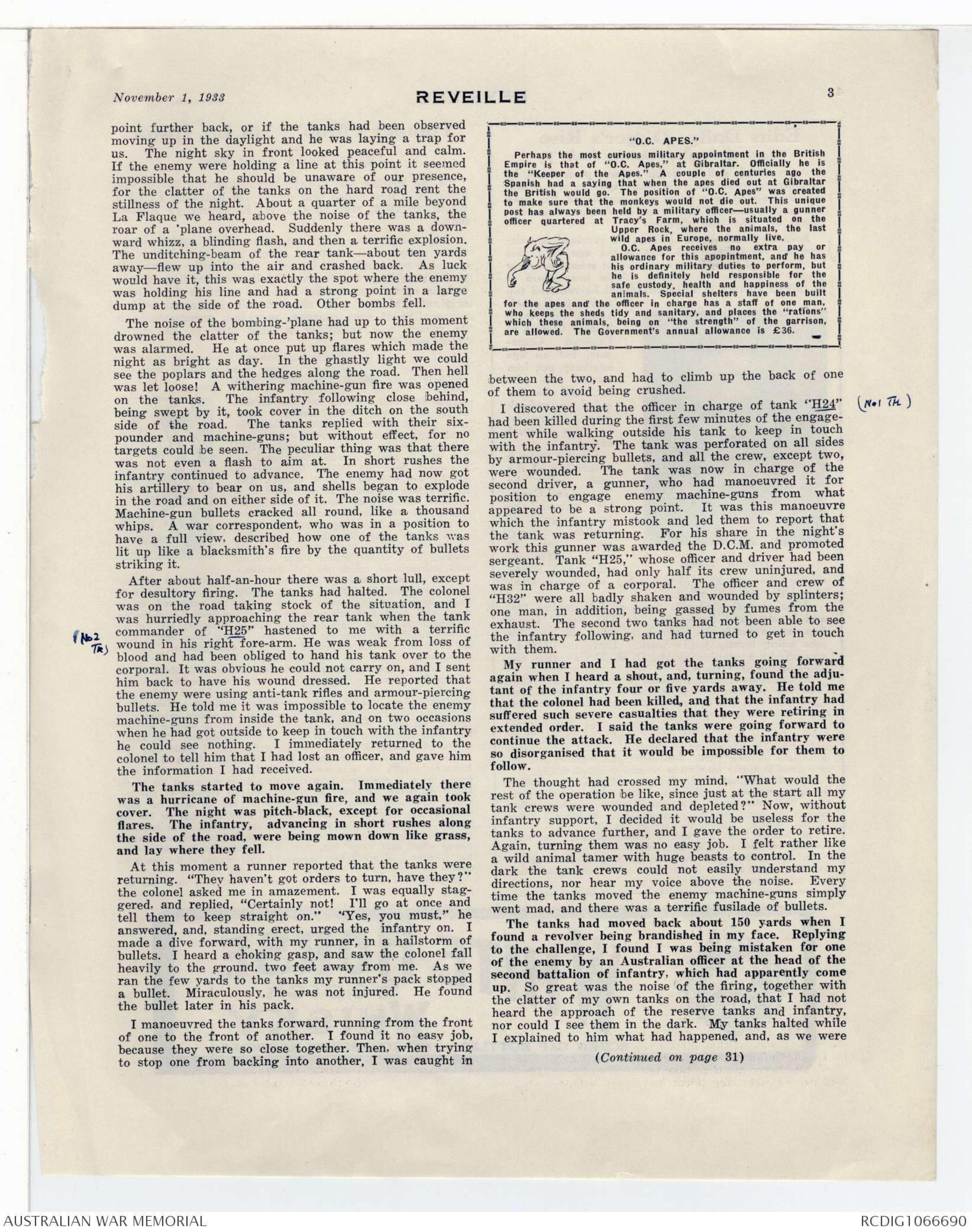
consisted of rolling plateaux similar to Salisbury
Plain. We could not fail to be observed & it was
a subject of general comment.
Reaching the road we kept in open
country on its left hand side but not in
the shadow of the trees. It was noticed that
38, 39 & 40 battalions trailed on behind
us, making a very long & very visible column.
After marching for some ¾ of an hour
we reached a steep declivity where we
rendezvoused with 3 Tanks. There was awll kept well kept German cemetery on the right of the
road. We continued our way with the
tanks leading with the intention of reaching
a cross road just beyond La Flêche by 10 pm.
It was distinctly understood (& I wish to emphasize
this) that we should encounter no opposition
as far as this cross road, hence column of route).
At this point we were to assume open order.
We crossed the old 1916 line soon
after 9 pm it now being dark & saw ahead
on our left a large abandoned timber
dump. After passing this, one tank
3
took up a position on the left flank as a sort of
flank guard & a platoon under Lieut. R.J.
Smith was detached for the same purpose.
All this time the tanks were making
great noise, the xxx writer marching at the
tail of the 2nd tank & at the front of the
37th Battalion.
On reaching the houses of La Flêche
in the right of the road there came a
sudden burst of highly concentrated machine
gun fire & which was directed on the furthermost
corner of these buildings making the road
practically impassable. The writer escaped
by keeping in the lee of the tank. Those following
immediately, having no cover, caught the
full blast & many casualties ensued at
this point. But many got by & the march
was resumed.
Almost immediately the leading
tank ran on a road mine & was
disabled completely blocking the road.
The battalion was now in considerably
confusion those behind pressing on & those
before wanting to get back & no one was in
control. Simultaneously the enemy lighted
many ground flares on the road & used
all sorts of fireworks which came right
over & illuminated the whole scene like
day. Fortunately the enemy fire was
frightfully erratic & high but casualties
were occurring with unpleasant frequency.
Many men got into a shallow ditch on
the right of the road, full of barbed wire,
but for some inexplicable reason not
enfiladed by M.G. fire. Others, the writer
included, sought such shelter as the numerous
trees afforded, & he identified no fewer than
10 M.G. guns concentrated on the stretch of
road from La Flêche to the leading tank -
less than 100 yards.
Meanwhile the enemy attacked the
5
rear of the column (40th Batt) with low-flying
planes & did much damage & causing the
whole column to become very badly [bunshed?].
About this time Lt. Col. Knox Knight made
his way, unaccompanied, from the neighbourhood
of the rear of his battn along the centre of
the road, now entirely clear of troops except
such as were casualties, & by a miracle
was uninjured. He reached the block in
the road & was endeavouring to straighten
out the mess when he was struck by what
the writer believed to be an anti-tank
rifle bullet which took off the back of his
head.
All this time the noise & confusion were
perfectly appalling & it seemed that no one
could ever escape.
However, there came a lull in
the firing & many men, acting entirely
on their own initiative, struck across the
fields towards Framerville & made an
improvised defensive flank.
Here we remained some 2 hours until
orders arrived from Brigade to withdraw.
This we did along the road in artillery
formation quite unmolested in any way.
We took up a position in the old 1916
line & remained there all the next day,
being heavily shelled with gas & H.E.
The whole show had been a most
complete fiasco, & many valuable lives lost.
It is interesting to note this. Just before
starting out an officer asked Col Knox Knight
(in the writers hearing) what he thought about it. He looked more
grave than usual & said words to this
effect "It is either a V.C ^Victoria Cross, or a wooden cross
for me" The writer never again heard him
speak.
Lieut N.G. MacNicol was Battn Scout Officer
at this time & as such was far ahead with
O.C. Tanks. The writer believes he received
a slight wound & was evacuated from the Battn.
The writer knew MacNicol very well especially
in the early days when they were tent mates
together.
Diagram - see original document
A German prisoner, 2 days later, ^said that they
had had over nearly 2 hours in which to prepare
a reception for us at this point. They received
the information from their balloons which
saw us start out & gave warning.
This is very feasible because the defence
was quite obviously carefully planned, & the fire
registered on the last house at La Flêche. Also the
road mine which disabled the tank is sound
evidence of this. I heard the explosion & saw
its effect immediately it occurred.
[*See Hickey's book
Rolling into Action*]
2
REVEILLE November 1, 1933
A Night Attack with the Tanks
"There will be a train-load of V.C.'s waiting for us when we get back—if it's a success. But
we won't want them of we get through with our lives."
WITHIN a few hours after he had
spoken these words, Lieut.Col.
E. Knox-Knight, the C.O. of the
37th Bn., A.I.F., was dead. An area
officer of Malvern (Vic.) before the war,
he was original 2/Command of the 37th,
and was promoted C.O. in mid-1917.
Col. Knox-Knight was killed in action
near Proyart, August 10, 1918, when his
battalion co-operated with the tanks in
their “first and last” night attack. The
whole operation ended disastrously, and
according to Capt. D. E. Hickey, of the
Tank Corps, whose article from
“The Royal Tank Corps Journal,” follows,
the 37th Bn., out of a strength of
1000, came out with only 100 survivors.
The Hundred Days' Battle, culminating
in the Armistice of November 11,
1918, commenced on August 8, when the
great success of the tanks was intoxicating.
They then almost seemed to be
regarded by responsible staff officers as super-terrific
monsters, which had such a devastating effect on the
enemy morale that they could not meet with failure. The
lesson had not yet been learned that after their initial
attack, the element of surprise, essential to a tank action,
had been lost. Among the 430 tanks in action on that
day were: “H24,” “H25,” and “H32,” under my command.
These machines were similar in appearance to those in
action at Cambrai, but were of an improved type, and
had a crew of an officer and five men. They had a maximum
speed of seven or eight miles an hour, and the
steering was easily manipulated and under the sole
control of the driver.
Two days later, August 10, at 3.30 p.m., I received
orders for a remarkable attack that night by my tanks,
co-operating with the 10th Australian Infantry Brigade
on the Amiens-St. Quentin road, about 17 miles in front
of Amiens. The operation had been so hurriedly arranged
that no written orders were available. My section was to
head the 37th Battalion of Australian Infantry, under
cover of darkness, against Proyart, with the object of
adjusting an inter-corps boundary. A second battalion
of Australian infantry, accompanied by another section
of tanks, was to move up in reserve. Zero hour was
fixed for 9.30 p.m., and the “starting-point,” where the
tanks had to pick up the infantry, was a place marked on
the map “Hospital.”
Instead of making a frontal attack on Proyart, the plan
was to penetrate the enemy line about one mile further
south, where it crossed the Amiens-St. Quentin road.
This was believed to be at La Flaque. After proceeding
along the highway for three-quarters of a mile the column
was to turn north at a prescribed cross-roads, and by
an encircling movement attack Proyart from the rear.
The tanks would advance in spear-head formation, one
on the road and one about fifty yards on either side of it,
the infantry following on the road. As soon as the whole
column had turned north, fast armoured-cars, with headlights
full on were to dash along the Amiens-St. Quentin
road. The idea was to delude the enemy into thinking
the attack was in that direction and so put him off the
tanks and infantry which had turned northwards.
We who were about to take part in this novel operation
realised its risks, for tanks had never before been used
Photograph - see original document
Lieut.-Col. Knox-Knight.
by night in this way. Besides, a great
deal had to be left to chance, for, owing
to shortage of time, none of the normal
work in the way of preparation and
precaution had been done. None of us had
the least idea what the ground was like;
and to the disadvantage of restricted
vision from inside a tank was now to be
added the possibility of complete darkness
inside and out. With a tank on
either side of the road, there was the
risk that in an engagement the tank
gunners would be unable in the dark to
distinguish our troops from the enemy,
and would fire into the men marching
on the road. The tanks and infantry
would have to keep in very close touch
to avoid this danger. There was every
possibility that the tanks moving in the
dark over unknown ground at the sides
of the road would be ditched. It was
certain that the enemy would now be
prepared to meet tanks with artillery, anti-tank rifles
and armour-piercing bullets, especially at a place where
his line crossed the main road.
At the time the orders were received, my tanks were
carefully camouflaged in a hedge in the derelict village
of Bayonvillers, a distance of about two and a half miles
from the Hospital. On the way up, as we trekked across
the fields, we saw an enemy 'plane up aloft on our left
above the road. We took cover by some trees, and wondered
if the tanks had been spotted, as it was broad daylight.
At eight o'clock, having reached the rendezvous, I
reported to the commanding officer of the 37th Battalion,
as previously arranged, and was told that zero hour had
been altered to ten o'clock, and, therefore, I was not to
bring my tanks into position at the head of the infantry
until a quarter-past nine.
At the appointed hour the tanks, “H24,” “H25,”
“H32,” in that order, moved forward in the twilight at
the head of the infantry, who followed in single file. We
had about one-and-a-half miles to go before we reached
La Flague. On seeing the actual ground which the
tanks would have to negotiate on either side of the road,
it was obvious that they simply could not do it, for it
was covered with dumps and old earthworks. After
consultation with the infantry colonel it was agreed that
all three tanks should keep to the road. The infantry
reconnaissance officer was appointed by the colonel to be
responsible for direction, especially for the exact point
where the whole column was to turn north after piercing
the enemy line. The colonel instructed me to accompany
him, so that I should be at hand if he wished to give
any particular orders for the tanks.
As I walked with him, ten to twenty yards behind the
tanks, he said to me, “There will be a trainload of V.C.’s
waiting for us when we get back, if it's a success. But,”
he added, “we won't want them—if we get through with
our lives." We adjusted our pace so as to reach La
Flaque about ten o'clock, when it would be sufficiently
dark to proceed.
When we got to La Flaque darkness had fallen. We
were all keyed up, expecting opposition at this point.
But, to our surprise, we met with none. The colonel and
I wondered if the enemy had withdrawn his line to a
(Continued next page)
REVEILLE\
Official Journal of the N.S.W. Branch of the R.S.S.I.L.A. Published
on the first of each month, price 3d. (annual subscription 4/-, post
free). Wingello House, Angel Place, Sydney. 'Phone: B 7766.
Telegrams: "Digger," Sydney.
Vol. 7—No.3 NOVEMBER 1, 1933
The Spirit of Comradeship
(By R. D. Hadfield, Secretary of the R.S.S.I.L.A.
(N.S.W. Branch), and Editor of Reveille)
FIFTEEN crowded and momentous years have neither
obscured the significance of Armistice Day nor lessened
the sincerity of its observance. On the eleventh day
of this month the commemoration will be honoured as
widely as in the years immediately succeeding the War,
and far more wisely. Its simple ceremonial will express no
mere deference to a waning tradition, but an emotion that
remains entirely genuine, and a gratitude that has lost nothing
of its strength.
"Each November must find diminished numbers of those
remembering the War as a chapter of experience, and a
larger proportion knowing it only as a chapter of history,"
said the "London Times" recently. "The
latter need to learn what the former can never forget,
and the opportunity of realising both the price of War and
the nobility with which it was paid will never be wanting
so long as the observances on Armistice Day continue.
"These lessons are steadily bearing fruit. There will be
speeches to show that the insane folly of War as a means of
settling International differences is understood at this
moment more clearly than at any previous time in the
world's history. For many reasons statesmen must needs
find the business of transmuting International convictions
into International action a task of colossal difficulty.
"The old clash of interests and the old distrust persist.
Some leaders favour armament to preserve peace; others
favour disarmament to promote it. The "War to end
War" was, for a time, a phrase instinct with hope. At
this later stage is it a vanished illusion?"
This Armistice Day the hope will be revived. It may
still meet with checks and disappointments. Yet, as we
salute the heroic dead at the eleventh hour of the eleventh
day we must feel sanguine that eventually the ultimate aim
will be achieved. Whether by us or by our successors,
there will yet be honoured men whose self-sacrifice means
not merely victory in the war, but victory, in the end,
over war itself.
in part the thoughts suggested by the recurring of Armistice
Day remain unaltered. Year by year its hush can be
for us no lifeless silence, but one in which we hear the
pulse of things eternal. Year by year we pay homage to
the dead, with hearts full of sacred and tender memories.
Year by year, also, we shall help, as they would desire,
their comrades to survive. The wearing of our poppy
will denote a privilege eagerly claimed, rather than a duty
regularly performed.
By this time most of the men who fought have left their
youth behind them, so that, even if they escaped partial
disablement, it is increasingly difficult for them to find
work in this period of widespread unemployment.
These facts make it the more imperative that the admirable
Fund which is linked with the names of a devoted
labour of those associated with the Soldiers' Poppy Day
Appeal—the United Returned Soldiers’ Fund—should
receive our fullest support. To honour those who fought
and fell, to help those who served and survived, are duties
common of every Armistice Day.
But it is true that each of these anniversaries takes a
special colour from the circumstances of its own moment,
and can give to us accordingly its individual message. Today
perhaps there is no leason which we may more usefully
learn from Armistice Day, and adopt in practice, than
the value of comradeship. From the days when the "Old
Contemptibles" crossed the Channel and the first Diggers
marched to the waiting troopships until the "Cease Fire"
sounded on November 11, 1918, the spirit of comradeship
was unshaken. Every page of the War's History, whether it
describes service at sea, on land, or in air, is glorified by
that spirit. It animated not our fighting men alone, but
all who served with them.
Nothing was more significant, for example, than the close
co-operation of the Army Chaplains of various denominations.
The spirit of comradeship worked wonders in those
days. Differences of class, of creed, of politics were seldom
allowed to hinder the full accord of common effort to meet
a common danger. Old feuds were forgotten. It would be
too much, of course, to say that there was no reappearance
of division before the War was over. Yet, in the early
days sufficient was achieved to show of what wonders the
spirit of comradeship is capable. At the front it exercised
its marvellous power to the end.
This month we may well reflect how vastly we—our
country—should gain by a revival of that spirit of comradeship
in something like its old intensity. It is true that
the dangers which menace us to-day are, in major part,
different in character from those which confronted us in
the war.
Then the struggle was begun with a common belief that,
however severe, it would at least be short. In recent
years we have had, unexpectedly, to face many new
crises. And again mistakes have recurred in some minds
of imagining that one strong effort would see us through
our difficulties. Again disappointments have imposed a
severe strain. Plainly, an emotional reaction of goodwill
is necessary, and our need is of a comradeship of persistence
that will work, and wait, and work again.
Such was the temper magnificently shown by those we commemorate
again this year. And the right way of doing them
honour is to imitate what was best in their example. What
that example suggests is less a series of formal agreements
to end our internal difficulties than ending temper, to
which such agreement will be the natural and inevitable
sequel. It is the spirit which shows no recrimination.
It seeks peace, not eschews it. It is the spirit which sets
us to understand and co-operate with people whose interests
and points of view may be far remote from our own.
1t has nothing in common with mere sentimentalism. It
springs from and is sustained through other external circumstances
by an act of the human will reinforced by
divine power. For, if this is the spirit which was revealed
in the War, no less is it the spirit of essential Christianity.
Seldom has its appeal been more needed than to-day. And
never should it come to us with more force than on this
anniversary.
If, in the solemn pause of the morning silence, the citizens
of this Australia and Empire should pledge themselves, by
the memory of those who fell, to live in the spirit of
comradeship, then surely could the true purpose of Armistice
Day be more worthily fulfilled.
Greets Comrades: 1st Div. G.O.C.
Lieut.-General Sir H. B. Walker, who commanded the
1st Australian Division during the greater part of the war,
sent greetings to all old A.l.F. comrades in a letter
written to "Reveille" from his home at Palace Lodge,
Crediton, Devon (Eng.), under date September 5.
It was with keen regret, General Walker said, that other
calls of duty caused him to sever his connection with the
A.l.F. From France, he went to the Italian front, and
afterwards to India, where the work was particularly strenuous.
He was now beginning to feel his old self again.
It was with pleasure that he read "Reveille" each
month, for it kept him in touch with the past, and in it
he saw names which "once used to be daily on my lips."
He was deeply honoured, the general added, at the kind
appreciation of him expressed by Lieut.-Col. Herrod, in
an article in the July issue of "Reveille."
3
November 1, 1933 REVEILLE
point further back, or if the tanks had been observed
moving up in the daylight and he was laying a trap for
us. The night sky in front looked peaceful and calm.
If the enemy were holding a line at this point it seemed
impossible that he should be unaware of our presence,
for the clatter of the tanks on the hard road rent the
stillness of the night. About a quarter of a mile beyond
La Flaque we heard, above the noise of the tanks, the
roar of a ‘plane overhead. Suddenly there was a downward
whizz, a blinding flash, and then a terrific explosion.
The unditching-beam of the rear tank—about ten yards
away—flew up into the air and crashed back. As luck
would have it, this was exactly the spot where the enemy
was holding his line and had a strong point in a large
dump at the side of the road. Other bombs fell.
The noise of the bombing-‘plane had up to this moment
drowned the clatter of the tanks; but now the enemy
was alarmed. He at once put up flares which made the
night as bright as day. In the ghastly light we could
see the poplars and the hedges along the road. Then hell
was let loose! A withering machine-gun fire was opened
on the tanks. The infantry following close behind,
being swept by it, took cover in the ditch on the south
side of the road. The tanks replied with their six-
pounder and machine-guns; but without effect, for no
targets could be seen. The peculiar thing was that there
was not even a flash to aim at. In short rushes the
infantry continued to advance. The enemy had now got
his artillery to bear on us, and shells began to explode
in the road and on either side of it. The noise was terrific.
Machine-gun bullets cracked all round, like a thousand
whips. A war correspondent, who was in a position to
have a full view, described how one of the tanks was
lit up like a blacksmith’s fire by the quantity of bullets
striking it.
After about half-an-hour there was a short lull, except
for desultory firing. The tanks had halted. The colonel
was on the road taking stock of the situation, and I
was hurriedly approaching the rear tank when the tank
commander of “H25” hastened to me with a terrific
[*No 2
Tk*]
wound in his right fore-arm. He was weak from loss of
blood and had been obliged to hand his tank over to the
corporal. It was obvious he could not carry on, and I sent
him back to have his wound dressed. He reported that
the enemy were using anti-tank rifles and armour-piercing
bullets. He told me it was impossible to locate the enemy
machine-guns from inside the tank, and on two occasions
when he had got outside to keep in touch with the infantry
he could see nothing. I immediately returned to the
colonel to tell him that I had lost an officer, and gave him
the information I had received.
The tanks started to move again. Immediately there
was a hurricane of machine-gun fire, and we again took
cover. The night was pitch-black, except for occasional
fares. The infantry, advancing in short rushes along
the side of the road, were being mown down like grass,
and lay where they fell.
At this moment a runner reported that the tanks were
returning. “They haven't got orders to turn, have they?”
the colonel asked me in amazement. I was equally staggered,
and replied, “Certainly not! I’ll go at once and
tell them to keep straight on." “Yes, you must,” he
answered, and, standing erect, urged the infantry on. I
made a dive forward, with my runner, in a hailstorm of
bullets. I heard a choking gasp, and saw the colonel fall
heavily to the ground, two feet away from me. As we
ran the few yards to the tanks my runner’s pack stopped
a bullet. Miraculously, he was not injured. He found
the bullet later in his pack.
I manoeuvred the tanks forward, running from the front
of one to the front of another. I found it no easy job,
because they were so close together. Then, when trying
to stop one from backing into another, I was caught in
[*“O.C. APES.”
Perhaps the most curious military appointment in the British
Empire is that of “O.C. Apes,” at Gibraltar. Officially he is
the “Keeper of the Apes.” A couple of centuries ago the
Spanish had a saying that when the apes died out at Gibraltar
the British would go. The position of “O.C. Apes” was created
to make sure that the monkeys would not die out. This unique
post has always been held by a military officer—usually a gunner
officer quartered at Tracy's Farm, which is situated on the
Diagram -see original document
Upper Rock, where the animals, the last
wild apes in Europe, normally live.
O.C. Apes receives no extra pay or
allowance for this apopintment, and he has
his ordinary military duties to perform, but
he is definitely held responsible for the
safe custody, health and happiness of the
animals. Special shelters have been built
for the apes and the officer in charge has a staff of one man,
who keeps the sheds tidy and sanitary, and places the “rations”
which these animals, being on “the strength” of the garrison,
are allowed. The Governments annual allowance is ₤36.*]
between the two, and had to climb up the back of one
of them to avoid being crushed.
I discovered that the officer in charge of tank “H24”
[*(No1 Tk)*]
had been killed during the first few minutes of the engagement
while walking outside his tank to keep in touch
with the infantry. The tank was perforated on all sides
by armour-piercing bullets, and all the crew, except two,
were wounded. The tank was now in charge of the
second driver, a gunner, who had manoeuvred it for
position to engage enemy machine-guns from what
appeared to be a strong point. It was this manoeuvre
which the infantry mistook and led them to report that
the tank was returning. For his share in the night's
work this gunner was awarded the D.C.M. and promoted
sergeant. Tank “H25,” whose officer and driver had been
severely wounded, had only half its crew uninjured, and
was in charge of a corporal. The officer and crew of
“H32” were all badly shaken and wounded by splinters;
one man, in addition, being gassed by fumes from the
exhaust. The second two tanks had not been able to see
the infantry following, and had turned to get in touch
with them.
My runner and I had got the tanks going forward
again when I heard a shout, and, turning, found the adjutant
of the infantry four or five yards away. He told me
that the colonel had been killed, and that the infantry had
suffered such severe casualties that they were retiring in
extended order. I said the tanks were going forward to
continue the attack. He declared that the infantry were
so disorganised that it would be impossible for them to
follow.
The thought had crossed my mind, “What would the
rest of the operation be like, since just at the start all my
tank crews were wounded and depleted?” Now, without
infantry support, I decided it would be useless for the
tanks to advance further, and I gave the order to retire.
Again, turning them was no easy job. I felt rather like
a wild animal tamer with huge beasts to control. In the
dark the tank crews could not easily understand my
directions, nor hear my voice above the noise. Every
time the tanks moved the enemy machine-guns simply
went mad, and there was a terrific fusilade of bullets.
The tanks had moved back about 150 yards when I
found a revolver being brandished in my face. Replying
to the challenge, I found I was being mistaken for one
of the enemy by an Australian officer at the head of the
second battalion of infantry, which had apparently come
up. So great was the noise of the firing, together with
the clatter of my own tanks on the road, that I had not
heard the approach of the reserve tanks and infantry,
nor could I see them in the dark. My tanks halted while
I explained to him what had happened, and, as we were
(Continued on page 31)
 Sandy Mudie
Sandy MudieThis transcription item is now locked to you for editing. To release the lock either Save your changes or Cancel.
This lock will be automatically released after 60 minutes of inactivity.